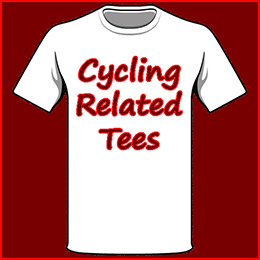Opinions
 Thu, September 27, 2012
Thu, September 27, 2012  If there is one thing I learned building bicycle frames; it is that no two people are alike.
If there is one thing I learned building bicycle frames; it is that no two people are alike.
If you could assemble a hundred people, all the exact same height, and then further separate into groups all those with similar leg length.
You would find within those groups, the thigh, lower leg and foot measurements would all vary.
Even within the same race, people have different facial features, complexions, hair color, etc. When you consider all peoples, the variations are infinite. An idividual's finger prints are unique, and now we know that DNA is too.
Most people accept these differences and even those who don’t, would seldom question why. Therefore, it really should be no surprise that people’s opinions will vary even more infinitely than our physical differences.
What are opinions but a collection of thoughts, based on our individual beliefs and experiences? Sometimes called a “Point of View,” meaning literally, the world as one individual sees it from where he stands.
No two individuals can have the same view if they stand in different places.
In spite of this we sometimes argue and fight defending our point of view, or trying to impose our opinions on others.
My father was an opinionated man. The problem was he didn’t have the education to back up or debate his opinions.
He was his own worst enemy; he couldn’t keep a job longer than a few months and he would be fired for mouthing off to his employer, or fighting with a co-worker.
Because he didn’t have intellect to back up his convictions, if someone strongly disagreed with him, he would get physical and fists would start flying.
 The problem was made worse by his heavy drinking. He never owned a car, and a bicycle was his only means of transport, outside of public transport.
The problem was made worse by his heavy drinking. He never owned a car, and a bicycle was his only means of transport, outside of public transport.
He was constantly arrested for being drunk and disorderly, and banned from every pub within a ten mile radius of our home. He would have to ride his bicycle further and further afield to get his beer.
Sad really, my father (Pictured right as a young soldier in the British Army.) in later life had no friends; nobody liked him. All because he would insist on foisting his opinions on other people. Why do some have this trait?
We accept every other difference in the human species, why do we expect the thought pattern of others to be in line with ours? We are each free thinking beings, and I can’t think of anything more random that a person's thoughts.
I think it is because our opinions are the yardstick by which we view and evaluate the world. It is how we judge situations and other people. Our opinions have been formed largely by our life experiences, our parents, teachers and other pivotal people in our lives.
Our opinions change over time, and with changing circumstances; if we find a better one we change it. However, at any given time our opinion is the best it can be. We just can’t understand why anyone would have a different opinion, after all, ours is the best.
It is not the difference of opinion that is wrong, it is the failure to see that the other’s view point is from an entirely different place.
I have found that defending my point of view is just a huge waste of time and energy. It achieves little; rarely does either side move any closer to the other’s way of thinking.
It is the single most cause of conflict between individuals, co-workers, friends, and families. On a larger scale, it is the basic reason nations assemble armies and go to war with each other.
Speaking of which, my father was aged 19, in 1929 and in the British Army fighting rebels on the Northwest Frontier of India. Under British rule at the time, that same area is now the border between Pakistan and Afghanistan.
This happened long before my birth, and now we are fighting the descendents of the people my father once fought. Does anything change, and has anyone learned anything? In more than eighty years has anyone changed the other’s point of view?
But now I am beginning to voice my opinion, and is that even worth the web space it is written on? Because in my opinion, if we spent a little less time defending our opinions, and a little more time in trying to understand the others fellow’s opinion, we might all be better off. But that’s just my opinion.
What is your opinion on opinions? Are they more trouble than they are worth, are they worth defending, are they worth anything at all?
 Dave Moulton | Comments Off |
Dave Moulton | Comments Off | 






















Reader Comments (11)
Dave,
Wow, well said! I always enjoy the blog!
ED
in my online reading I discovered critical thinking, yes some things are a matter of opinion, handlebar height, marks awarded in ice skating, most important contribution to science or the peace process, who owns a set of islands off China and Japan, etc. but some are a matter of measurable evidence. Even if someone (or a group) has the intellectual and verbal ability to present a watertight case and defend it, another can reject it because it doesn't suit them; perhaps they are not able to understand it or maybe another group whose interests would be harmed by the original case are misrepresenting the evidence as a matter of opinion, thereby undermining it. The internet has hardened opinion in certain areas, it is easy to find reinforcement of any view you have, Michael Jackson isn't dead, it's all there. It has enabled birds of a feather to flock together. Interest groups express their opinions while billions of people are blissfully unaware that such opinions or interests exist, let alone matter.
But you are right, it's not worth fighting over; it's a big world out there and each of our worlds has limited horizons. http://scienceblogs.com/
Good post Dave. There are a small number of people in the world who are just contrary (I'm sorry your dad sounds like one of them). For many, this contrariness isn't just in the realm of politics, religion, or bicycles, but permeates all of the person's social interactions. These people end up being toxic, polluting whatever environment they are in. Other people will dis-invite them, avoid them, shut them out. They end up friendless and alone. Peace.
Lovely post, Dave.
However, I wouldn't be so quick to ascribe your father's anger/fighting issues to a lack of education.
I grew up with a really bad temper and, to this day, my father has anger control issues. He doesn't drink, but it's widely known in our social circle, that it's really easy to trigger his temper. He'll start out an argument making perfectly logical statements, but it will quickly devolve into a shouting match.....and he sometimes has to be restrained because he can get violent. Is he opinionated? Perhaps.
In an effort to make sure I don't go down that same road, I've been learning to control my temper, and today I rarely let it show. It's like a dormant volcano....it's still there, and it can go off at a moment's notice, but I can control it.
What I figured out is that I have ADHD, and also that my father would probably be diagnosed with the same thing if he actually went to a psychologist. While I think that people are too quick to diagnose mental and behavioural issues, sometimes these things do exist, and they make it hard to function socially......especially in a society that doesn't make allowances for these issues. I have chosen not to medicate myself, but to try and change my behaviour with willpower. It's hard, and I can remember the times when I lost control, and knew I was losing control, but was unable to stop it.
So perhaps your father had something else going on....maybe it was something he couldn't control. We'll never know.
------------
To return to your post: voicing your opinion is certainly worth it. Sometimes people listen. Hopefully, they'll use your point of view to inform their own. As you point out, you cannot expect everyone (of maybe even anyone) to agree with you, or to change their point of view to align with yours. But that's not the point of stating your opinion.
Dave --
Good post.
My opinion is that opinions are like buttocks.
We all have them.
But we should think before displaying them publicly.
leroy
The problem with opioins is how they are presented by the one with the opinion and how the reciever listens. If the opioinion is communicated in a neutral way as opposed to "preaching" or being "parental" it is easier to listen as it may well be worth understanding.
We all create our own mental models of how life works. It is not unlike the three blind men describing an elephant. What is of value is for the 3 to talk to each other to understand what they are feeling!
Listening skills are important too. One should learn to be open to understanding others views and decide if they have value or not. You don't need to express the latter!
I think a lot of our opinions are based on our personal priniples and values. Everyone has different sets and the view they have of life is based on them. What is important to one is not to another. That doesn't make it right or wrong, just different, they can often coexist. Such was not the case in the 1770's between Britain and one of its colonies, hence the USA. As time has gone by, the difference is still there but not as extreme as say, some middle east countries!
Dave, thanks for your thoughts!
In my opinion your opinion makes a lot of sense. Even though I turn the other cheek I've been experiencing a lot of rabid disagreement with some of my opinions lately and it always amazes me how angry some folk can get when all I was doing was responding to their questions about what I think - if they didn't want my opinion or can't handle it being different to theirs why ask?
The things you can't see you can't understand. I've found that the opinions of too many are based on what they clearly don't want or refuse to see.
Many see cars as "freedom", the ads support this view and add sexiness. No where in these ads are the mention of the most important facts: death, fuel costs, pollution, maintenance costs, traffic, noise, road rage, intimidation, DOD expenditures to protect trade routes, etc. The public is being misled on a grand scale and too few care as the majority have swallowed the lies and have become addicted.
What we can't see is explained in an enjoyable TED video: http://www.youtube.com/watch?feature=player_embedded&v=8EUy_82IChY#!
Dave a very honest and informative post.
I can relate to this so much. For what its worth for all of your Dads traits as you say I would have loved to have sat down and listened to him.
You could quickly come to the conclusion that because of a persons heavy drinking, inhability to hold down a job, general highly opiniated attitude etc and ending up being lonely and having no friends that they have a trait.
I did myself think that of these type of people until years ago. And of a very close person to me that was vertually a mirror image of your dad.
I dont now.
I dont believe your Dad had traits. I wish I had the time to explain but I just think your Dad was good at what he was good at. Drinking and Speaking his mind.
Okay maybe not the best things to be good at but never the less he was.
You was an excellent frame builder, you was good at that.
A very complicated subject. When someone voices an opinion at me I always try to view it from their world.
I feel very special that you shared this post.
I think if that opinion is based on intelligence, it may be worth of sharing. It may present a different look at things, a different food for thought, for the reader/listener.
Sorry for the second post on this issue, but the original post put me in mind of a (very) short story, "The Reunion" by John Cheever. Published originally in The New Yorker in 1962, it really sums up some of the themes in the original post. This link leads to a pdf of the story: http://www.janiesantoy.com/5365/seminar/Reunion.pdf
Only a five minute read but lasting impact.